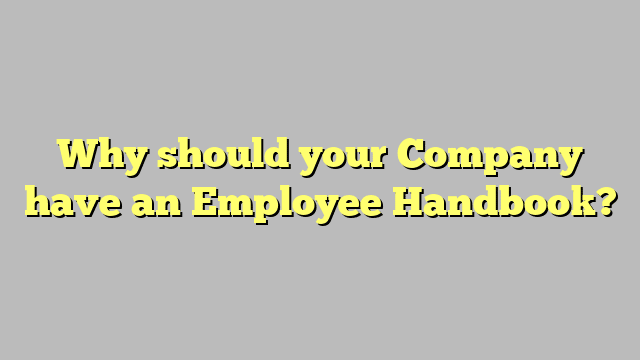Whether your company boasts a team of five or 5,000, an employee handbook can be one of the most powerful tools in your arsenal.
If you’re an employer currently scratching your head over the whats, whys, and hows, this guide is just for you!
Here’s everything you need to know.
What is an Employee Handbook?
The employee handbook is essentially a manual that is given by an employer to all employees to provide crucial job-related information.
The content contained within it should cover general information about the company, case-specific policies, and data relating to the company culture.
You may have also heard people refer to the employee handbook as an employee manual, staff handbook, or company policy manual. They are all exactly the same thing.
While designed primarily to be used as part of the onboarding process for new employees, businesses that plan to introduce one for the first time should additionally aim to provide existing staff members with a copy.
The benefits of an Employee Handbook
Before creating, publishing, and distributing your employee handbook, it’s imperative that you understand the reasons for introducing this document to your workforce.
Here are the key benefits implementing a comprehensive, bespoke employee handbook.
1) Communicate expectations with clarity
The employee handbook allows you to set out your expectations of all staff members while simultaneously detailing the benefits they can expect from working for the company.
For example, it can provide clear information on how you tackle workplace bullying and harassment to reassure all team members.
In regards to your expectations of them, the employee handbook can cover various topics, such as:
- Dress codes,
- Staff conduct,
- Sickness procedures,
- Holiday requests,
- And more.
By setting out these details from the outset, you remove any ambiguity.
This translates to a saving of time, money, and disagreements.
2) Handle misconduct fairly
The employee handbook also sets out your policies across a broad range of subjects.
The list includes, but is not limited to;
- Health and safety policy,
- Data protection policy,
- Flexible working policy,
- Equal opportunities policy,
- Maternity and paternity policies.
However, it also details the repercussions of breaking the company policies.
Whether it’s the drug and alcohol policy, the employee behaviour policy or another issue in question doesn’t matter.
A clear and concise disciplinary procedure allows you to handle all misconduct in a fair and consistent approach.
Employees cannot claim mistreatment if they were informed of what to expect in advance.
3) Boost staff productivity
While disciplinary action shouldn’t be used as a scare tactic, it is a useful deterrent that can keep employees on task.
No business owner should worry about colleagues enjoying a little casual chat or checking their social media for a few minutes each day.
However, you must not allow those items to become problematic.
Aside from preventing disruptions of this nature, the company policy can provide guidance to employees on common queries, such as how to go about asking for a variation in their working hours.
Likewise, the contact details of the appropriate HR teams or managers can ensure that HR requests are sent to the right place, which saves time and prevents confusion.
4) Protect your business
Your staff members aren’t the only beneficiaries of a detailed and comprehensive employee handbook.
It also protects your business in relation to brand image as well as financial exposure from Employment Tribunal claims.
Some examples of how the employee handbook can be used in this manner include;
Implementing a social media policy to stop employees posting discriminatory or controversial posts (even from personal accounts) that could harm the company’s image.
Setting out clear and defined details relating to non-disclosure agreements and other tools that affect private data and leads.
Helping to defend legal claims such as unfair dismissal by showing that you had fair disciplinary policies in place.
Apart from the direct benefits, it’s sure to provide peace of mind.
5) Support managers and senior staff
Time is money. When your employee handbook sets out the expectations and appropriate action when the company standards are not met, managers can handle situations in the fastest possible time.
The employee handbook will help them know:
- When a situation requires intervention,
- What type of action is required,
- Who to contact in regards to monitoring the situation,
- How to follow up the process.
The benefits aren’t limited to disciplinary either. It can extend to grievance policies, holiday requests, and a host of other features.
6) Cultivate a united atmosphere
Last but not least, the employee handbook unites your team.
Not only is a tool that welcomes new staff members to the team, but it also serves to keep everyone to be treated equally regardless of their job role and status.
This is arguably the best reward of all.
What to include in your Employee Handbook
Now that you appreciate the benefits of an employee handbook, the next step is to start planning the publication.
While this is something our experts can help you achieve, you must be sure to consider the following additions:
- A welcome statement,
- Definitions,
- Performance guidelines,
- Company regulations,
- Contacts,
- Detailed policies,
- Pay and pension details,
- A declaration of receipt.
For the best results, the employee handbook must be accessible to all employees and reviewed on a regular basis.
Meanwhile, a digital version can be particularly useful for companies hoping to adopt greener processes.





